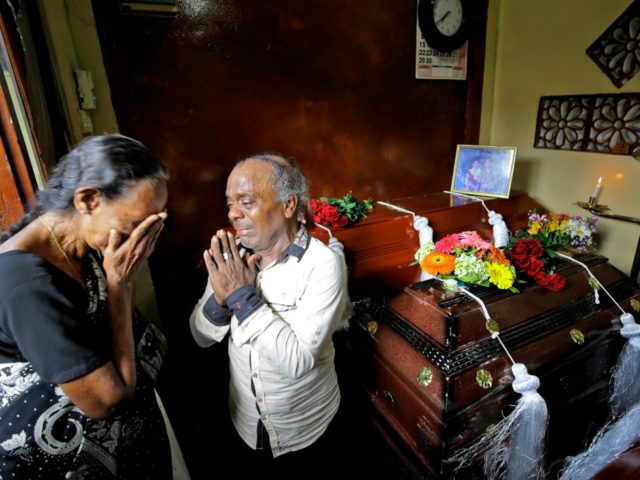Officials from other nations are disputing, or at least declining to support, Sri Lankan Defense Minister Ruwan Wijewardene’s contention that the Easter Sunday terrorist bombings in his country, which killed 359 people as of the latest count, were intended as retaliation for the shootings at mosques in Christchurch, New Zealand, in March.
Wijewardene advanced his theory at a meeting with the Sri Lankan parliament on Tuesday without revealing any information that could establish a link between the Easter bombings and Christchurch. Terrorism experts immediately expressed skepticism that the sophisticated weapons and tactics employed in the Sri Lanka attacks could have been assembled in the month that has elapsed since the Christchurch atrocity.
New Zealand Prime Minister Jacinda Ardern disputed the notion of retaliation for Christchurch at a press conference on Wednesday.
“We haven’t received anything officially nor have we received any intelligence reports that corroborate what has been said in Sri Lanka,” said Ardern.
“Sri Lanka will be in the very early stages of its investigations. So we are simply stepping back and allowing them to undertake those, but we have nothing at this stage to corroborate what is being said,” she elaborated.
A spokeswoman for Ardern’s office indicated the prime minister was aware of Wijewardene’s remarks and reiterated that New Zealand wishes to give the Sri Lankans time to complete their investigation, but also wants to make clear that it has “not yet seen any intelligence upon which such an assessment” of retaliation for Christchurch might be based.
Wijewardene doubled down on his assertions Wednesday, explaining that the terrorist cells involved in Easter bombings had been planning an attack for some time, but were motivated to carry out their plan by a desire to retaliate for the Christchurch shooting.
The most important bit of evidence advanced for this theory is a memo leaked from the Sri Lankan police that was written ten days before the attack, in which the police noted one member of an organization believed to be involved in the bombings began “regularly updating [social media] accounts with hate speech against non-Muslims since the March 15, 2019, attacks on Muslim mosques by a Christian individual in New Zealand.”
Sri Lankan President Maithripala Sirisena delivered an address to the nation on Tuesday in which he pledged to “completely restructure the police and security forces in the coming weeks” and expected to “change the heads of defense establishments within the next 24 hours,” which could mean Wijewardene’s job is on the chopping block.
Sirisena said one reason for the coming wave of firings in the defense establishment is that security officials who received intelligence from foreign agencies about an impending attack “did not share it with me.”
“By now it has been established that the intelligence units were aware of this attack and a group of responsible people were informed about the impending attack. However, this information has been circulated among only a few officials,” he said.
India issued the alert referenced by Sirisena on April 11 and warned of a possible suicide attack on Christian churches and the Indian High Commission in the capital city of Columbo by an extremist group called National Towheeth Jamaath and its leader, Mohamed Zaharan Hashim.
Hashim is the only unmasked individual in the footage released by the Islamic State on Tuesday to bolster its claim that the Sri Lanka attackers were its “soldiers.” The video depicts Hashim and seven other masked and robed individuals pledging allegiance to the Islamic State in a ritual known as bay’ah.
Hashim is a longtime Islamist radical with a few hundred social media followers who preached violent conflict against non-Muslims. Gulf News on Wednesday quoted a Sri Lankan Muslim leader who described Hashim as a “drop-out” from an “average Muslim middle-class family” whose followers were in “continuous conflict with the traditional mosque-goers,” including threats of physical violence against those who did not embrace Hashim’s jihad theology.
Reuters quoted leaders of “three prominent Sri Lankan Muslim groups” who said they repeatedly warned the authorities about Hashim after he began expressing sympathy for the Islamic State. One of the now-deleted videos Hashim posted to Facebook threatened to use explosive-laden vehicles to murder civilians.
Defense Minister Wijewardene on Wednesday suggested Hashim might have led an even more radical splinter group from National Towheeth Jamaath that pledged allegiance to ISIS and suggested Hashim may have “committed suicide in one of the attacks.”
Graeme Wood at The Atlantic considered the information about Hashim and his ties to the Islamic State and found it significant that ISIS did not frame the Sri Lanka attack as revenge for Christchurch when it claimed responsibility on Tuesday.
The ISIS statement fulminated against Christians and “Crusaders” but did not refer to New Zealand. Wood theorized this might be because ISIS demonizes Muslims who choose to live outside the Middle East and submit to non-Islamic governments, so it did not wish to claim it acted to avenge New Zealand Muslims who “sold their souls to the infidel.” ISIS is far more interested in demonstrating it survived the fall of its “caliphate” in Syria and Iraq and remains a force to be reckoned with.

COMMENTS
Please let us know if you're having issues with commenting.